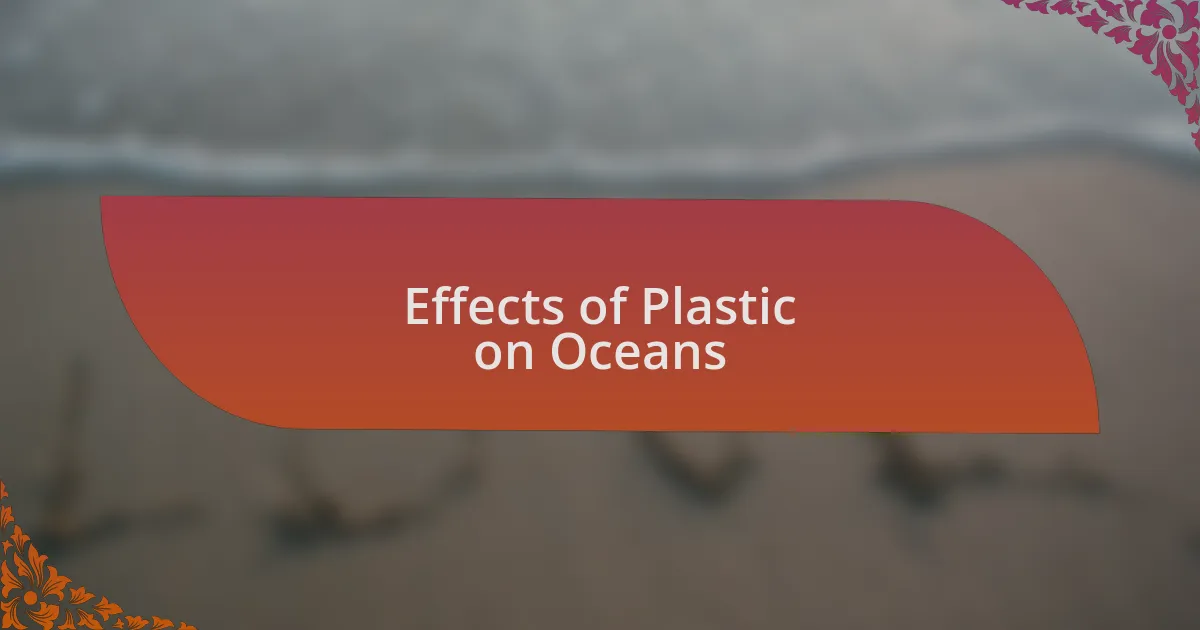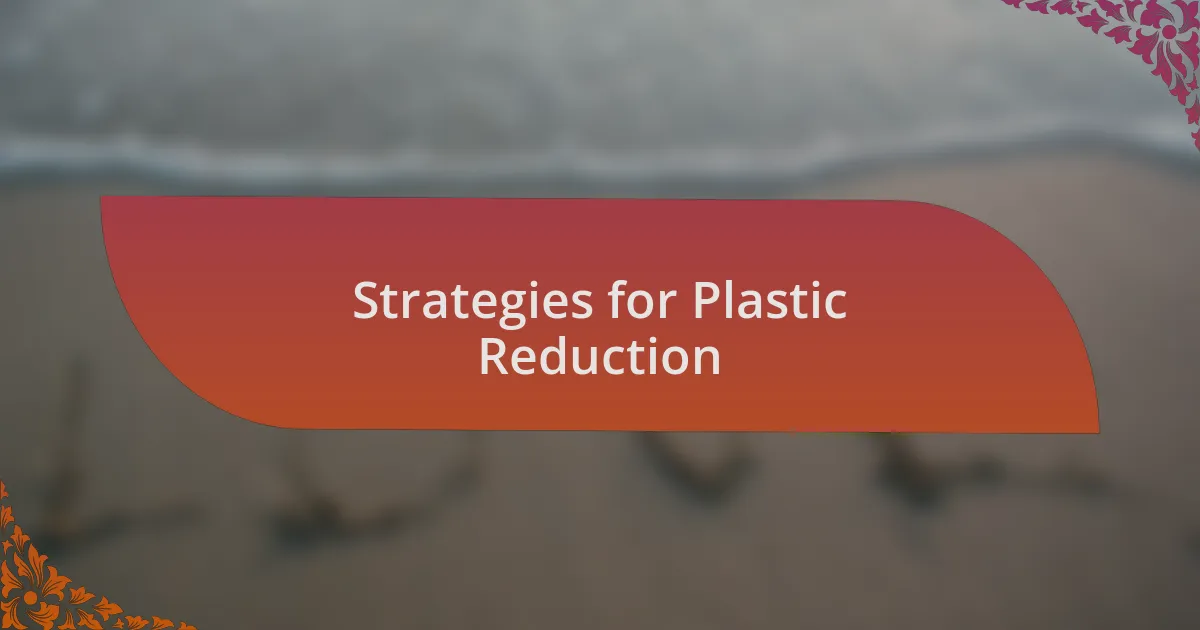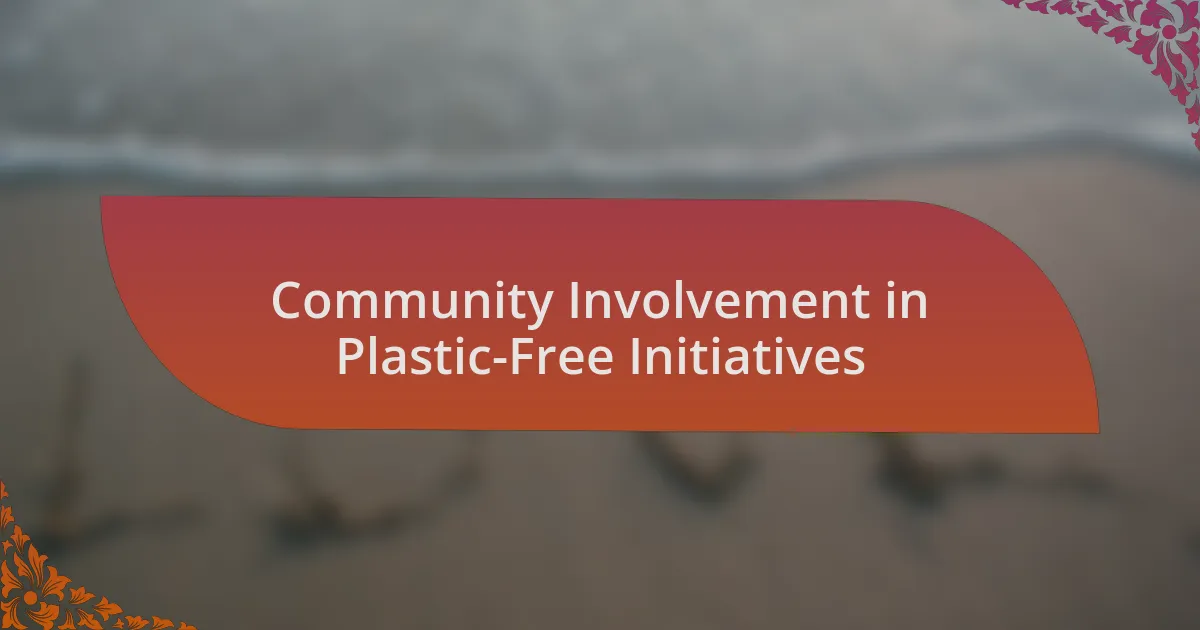Key takeaways:
- Ocean conservation is vital for preserving marine ecosystems, with plastic pollution causing significant harm to marine life and impacting future generations.
- Reducing plastic use is essential for environmental and economic health, as it affects wildlife and local industries relying on marine resources.
- Adopting reusable alternatives and supporting eco-friendly businesses can drive significant change, fostering a culture of sustainability.
- Community involvement in clean-ups and educational initiatives can enhance awareness and promote collective action for a plastic-free future.

Understanding Ocean Conservation
Ocean conservation is about more than just protecting a vast body of water; it’s about preserving the intricate ecosystems that thrive within it. I remember my first scuba diving experience—floating among colorful reefs, I was struck by the amazing life forms that call the ocean home. Can you imagine the loss if these environments succumb to pollution and climate change?
The oceans cover over 70% of our planet, playing a vital role in regulating our climate and supporting countless life forms. When I learned that more than a million marine animals die each year due to plastic pollution, it felt personal. I couldn’t help but wonder: what kind of legacy are we leaving for future generations if we don’t take action now?
Understanding ocean conservation necessitates acknowledging the interconnectedness of all life. Each time I walk along the shore and see trash washed up in the sand, I feel a pang of guilt—what if that piece of plastic ended up in the belly of a sea turtle? Our choices and actions shape the health of the ocean, and by tapping into our collective responsibility, we can foster a thriving marine world.

Importance of Reducing Plastic
Reducing plastic is crucial not only for marine life but for our overall well-being. One time, while volunteering for a beach cleanup, I was shocked to pull a tangled mass of plastic debris from the water. It hit me that each piece we rescue could mean the difference between life and death for a marine creature. Isn’t it unsettling to think that our daily habits might be endangering such beautiful beings?
Plastic takes hundreds of years to decompose, which means the pollution we contribute today affects future generations as much as it does our own. When I reflect on the sheer volume of plastic that ends up in our oceans each year, I can’t help but feel frustrated. Why do we continue to ignore such a pressing issue? Each small effort, like using reusable bags or bottles, can pave the way for more sustainable practices and contribute to a cleaner ocean.
Moreover, the economic impact of plastic pollution cannot be overlooked. During a recent chat with a local fisherman, he lamented how declining fish populations, partly due to plastic in their habitats, are affecting his livelihood. This connection between plastic waste and our economy makes it clear that reducing plastic is not just an environmental concern; it’s a personal one that affects us all. Why wouldn’t we want to secure a thriving, valuable ocean for ourselves and future generations?

Effects of Plastic on Oceans
Plastic pollution has a devastating impact on marine ecosystems. I recall the first time I saw a sea turtle entangled in a plastic net during a snorkeling trip. The sight was heart-wrenching and underscored how our actions directly harm these majestic animals. It truly makes you wonder: could something as simple as our choice of materials create a more harmonious relationship with our oceans?
Every year, millions of tons of plastic enter our oceans, creating hazardous environments for marine life. I’ve read accounts of fish mistakenly consuming microplastics, thinking they were food. This not only jeopardizes their survival but also poses a threat to the humans who rely on seafood for nourishment. It raises a critical question: how many generations of marine life will we sacrifice for our convenience?
The impact of plastic on oceans extends beyond wildlife; it disrupts delicate ecosystems. I often think about the coral reefs, which are already under stress from climate change, now facing the additional burden of plastic waste. How much more can our oceans endure before we reach a tipping point? Each piece of plastic we discard with disregard can lead to irreversible damage, urging us to reconsider our habits for the sake of our oceans.

Strategies for Plastic Reduction
One effective strategy for reducing plastic is to adopt reusable alternatives in our daily lives. I remember the shift I made from single-use plastic bags to sturdy cloth totes; it felt small at first, but each trip to the grocery store became a subtle yet meaningful step towards sustainability. How refreshing it is to know that a simple change in habit can have ripple effects beyond our immediate surroundings!
Another impactful approach is to support local and sustainable businesses that prioritize eco-friendly packaging. When I discovered a nearby café that uses biodegradable materials and composts their waste, I felt a sense of pride in contributing to an eco-conscious community. Isn’t it empowering to know that our consumer choices can drive a demand for better practices?
Education and awareness campaigns also play a critical role in fostering a culture of plastic reduction. I’ve participated in beach clean-ups where volunteers come together to pick up litter, but what struck me most was the conversations that followed. Sharing stories about the marine animals we love and the plastics threatening them can inspire others to take action. Isn’t it incredible how awareness can shift perspectives and motivate a collective commitment to change?

Community Involvement in Plastic-Free Initiatives
Organizing community events can have a profound impact on plastic-free initiatives. I remember participating in a neighborhood cleanup where we not only collected trash but also engaged in meaningful discussions about the importance of reducing plastic use. Seeing familiar faces come together for a shared cause created a strong bond; it was a powerful reminder that collective action can lead to significant change. Have you ever felt that sense of unity when working towards a common goal?
Local groups also play a crucial role in promoting sustainable habits through workshops and educational programs. I once attended a session on DIY natural cleaning products, and I was pleasantly surprised by how quickly people embraced the idea of ditching plastic packaging. It was inspiring to witness not just the excitement in the room, but also the tangible commitment to adopting more sustainable practices in our everyday lives. Isn’t it amazing how knowledge can empower us to make better choices?
Additionally, grassroots movements can amplify awareness of the issue at hand. I joined forces with a local environmental organization to advocate for stricter regulations on plastic use in our community. The energy during our rallies was infectious, and I could feel the passion in the air as we gathered support. This experience reinforced my belief that when individuals come together, our voices are much louder. Isn’t it empowering to know that our community can drive policies that protect our oceans and promote a plastic-free future?